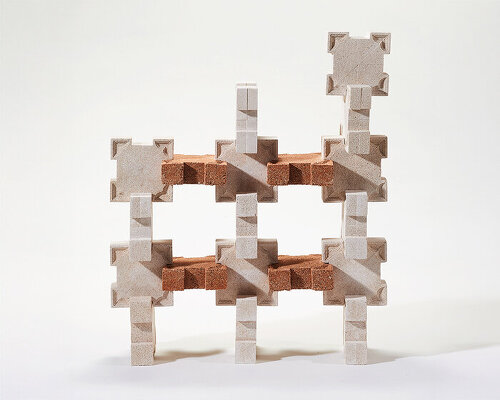A SUSTAINABLE BUILDING MATERIAL SOLUTION FROM EGGSHELLS
A team of South Korean designers transforms discarded eggshells into Re:shell, a biodegradable building material
designed as a series of modular, interlocking brick-like elements. Conceived to combat the nation’s rising construction waste, the project utilizes the natural properties of eggshells to create a zero-waste composite with applications ranging from small products to large-scale architecture. The blocks safely return to nature at the end of its life cycle, serving as a sustainable solution to a pressing urban problem in South Korea.
all images courtesy of Re:shell
TACKLING SOUTH KOREA’S CONSTRUCTION WASTE MANAGEMENT
The project began as a response to South Korea’s rapid industrialization and urbanization, shaped by large-scale construction from the 1970s and 80s. As many of these aging structures are slated for redevelopment, the nation faces a significant waste management challenge, with construction materials accounting for 45% of the nation’s total waste. The design team, part of the Living Design Lab at Seoul National University – Department of Design, addresses this issue by merging traditional Korean architectural philosophy with a new material science.
Re:shell uses discarded eggshells to create modular, biodegradable building bricks
LOCAL WASTE TURNS INTO MODULAR BIODEGRADABLE BRICKS
The team chose eggshells as the core material for their abundance and ease of collection from local bakeries and restaurants. Crucially, the main component of an eggshell is calcium carbonate (CaCO₃), a key ingredient in cement that provides strong binding and hardening qualities. The production process involves washing, drying, and grinding the shells into a fine powder, which is then combined with natural additives to enhance its properties. The team experimented with red clay for improved durability, wheat bran for a smoother texture, and straw for greater flexibility and lighter weight. The material demonstrated exceptional hardness in strength tests and showed clear signs of natural decomposition when buried in soil, ensuring zero residual waste.
Inspired by a design philosophy rooted in the unity of nature and human, the team created prototypes for various scales. Echoing Korean traditions like the portable soban table and adaptable room layouts, the Re:shell composite offers a versatile and scalable application range, from small-scale products and interior partitions to exterior facades. The team’s future goals include developing waterproofing while maintaining 100% biodegradability and exploring its potential as a structural building material.
applications range from small products to large-scale architecture
with the natural properties of eggshells the South Korean team creates a zero-waste composite
the biodegradable building material is designed as a series of modular, interlocking brick-like elements
the eggshells can be easily sourced from local bakeries and restaurants
the material showed exceptional hardness and a clear capacity for natural decomposition, ensuring zero waste
project info:
name: Re:shell
institution: Living Design Lab at Seoul National University – Department of Design | @livingdesignlab.snu
design team: SungYun Jang, SuYang Choi, Hwi Song, SeongHa Lim, YoungYun Cho
material: eggshells
designboom has received this project from our DIY submissions feature, where we welcome our readers to submit their own work for publication. see more project submissions from our readers here.
edited by: lisa kostyra | designboom
The post re:shell uses discarded eggshells to create modular, biodegradable building bricks appeared first on designboom | architecture & design magazine.

